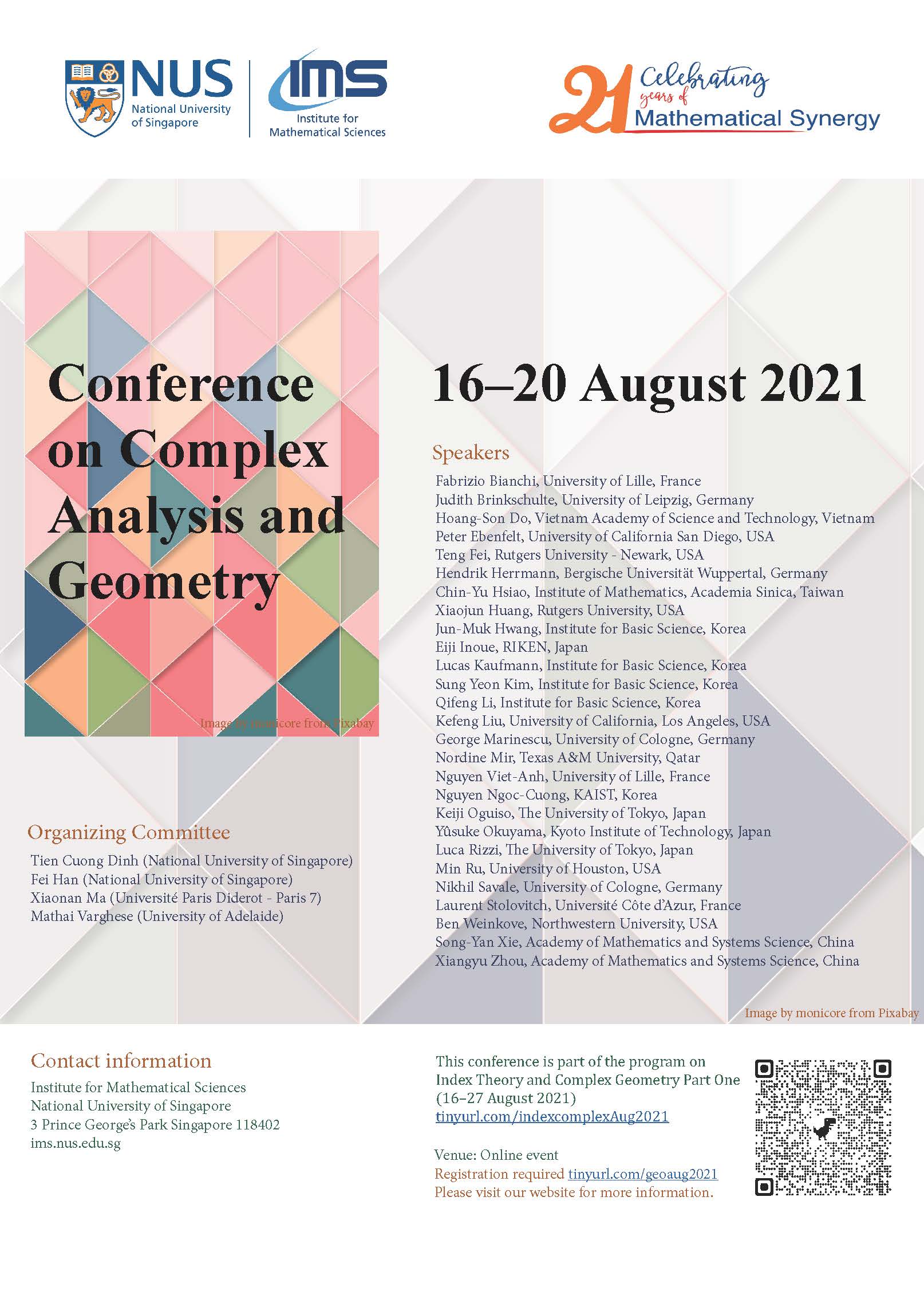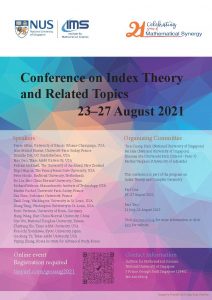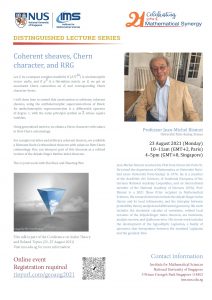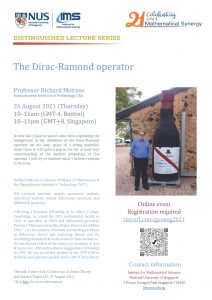Organizing Committee
Co-chairs
- Tien Cuong Dinh (National University of Singapore)
- Fei Han (National University of Singapore)
- Xiaonan Ma (Université Paris Diderot - Paris 7)
- Mathai Varghese (University of Adelaide)
Contact Information
General Enquiries: ims(AT)nus.edu.sg
Scientific Aspects Enquiries: mathanf(AT)nus.edu.sg
Overview
Interactions between people working in Index Theory and Complex Geometry are increasing. One of the reasons is that although researchers use different tools and techniques, their studies have profound connections and are understandable to people from both sides. Sharing experiences and techniques is an opportunity for them to accelerate collaboration works. Index Theory and Complex Geometry recently both have spectacular developments. In this program, we plan to dig out more materials on complex geometry side of global analysis led by recent development on geometric hypoelliptic Laplacians.
Another focus of our program will be the interaction of analytic localization technique in local index theory and complex geometry, for example, the study of Bergman Kernel.We expect that recent works in complex geometry, on pluripotential theory, the Hormander L2 method and the study of Bergman kernels would have many things to share with index theory.
Activities
| Date | Abstract | |
|---|---|---|
| Conference on Complex Analysis and Geometry | 16–20 August 2021 | View |
| Conference on Index Theory and Related Topics | 23–27 August 2021 | View |
Venue
Online
Speakers (16–20 August 2021)
- Fabrizio Bianchi, University of Lille, France
- Judith Brinkschulte, University of Leipzig, Germany
- Hoang-Son Do, Vietnam Academy of Science and Technology, Vietnam
- Peter Ebenfelt, University of California San Diego, USA
- Teng Fei, Rutgers University - Newark, USA
- Hendrik Herrmann, Bergische Universität Wuppertal, Germany
- Chin-Yu Hsiao, Institute of Mathematics, Academia Sinica, Taipei
- Xiaojun Huang, Rutgers University, USA
- Jun-Muk Hwang, Institute for Basic Science, Korea
- Eiji Inoue, RIKEN, Japan
- Lucas Kaufmann, Institute for Basic Science, Korea
- Sung Yeon Kim, Institute for Basic Science, Korea
- Qifeng Li, Institute for Basic Science, Korea
- Kefeng Liu, University of California, Los Angeles, USA
- George Marinescu, University of Cologne, Germany
- Nordine Mir, Texas A&M University, Qatar
- Nguyen Viet-Anh, University of Lille, France
- Nguyen Ngoc-Cuong, Korea Advanced Institute of Science and Technology (KAIST), Korea
- Keiji Oguiso, The University of Tokyo, Japan
- Yûsuke Okuyama, Kyoto Institute of Technology, Japan
- Luca Rizzi, The University of Tokyo, Japan
- Min Ru, University of Houston, USA
- Nikhil Savale, University of Cologne, Germany
- Laurent Stolovitch, Université Côte d'Azur, France
- Ben Weinkove, Northwestern University, USA
- Song-Yan Xie, Academy of Mathematics and Systems Science, China
- Xiangyu Zhou, Academy of Mathematics and Systems Science, China
Speakers (23–27 August 2021)
- Pierre Albin, University of Illinois Urbana-Champaign, USA
- Jean-Michel Bismut, Université Paris-Saclay, France
- Xianzhe Dai, UC Santa Barbara, USA
- Hao Guo, Texas A&M University, USA
- Pedram Hekmati, The University of Auckland, New Zealand
- Nigel Higson, The Pennsylvania State University, USA
- Peter Hochs, Radboud University, Netherlands
- Bo Liu, East China Normal University, China
- Richard Melrose, Massachusetts Institute of Technology, USA
- Martin Puchol, Université Paris-Saclay, France
- Shu Shen, Sorbonne Université, France
- Yanli Song, Washington University in St. Louis, USA
- Xiang Tang, Washington University in St. Louis, USA
- Boris Vertman, University of Oldenburg, Germany
- Hang Wang, East China Normal University, China
- Siye Wu, National Tsinghua University, Hshinchu
- Zhizhang Xie, Texas A&M University, USA
- Ken-Ichi Yoshikawa, Kyoto University, Japan
- Guoliang Yu, Texas A&M University, USA
- Yeping Zhang, Korea Institute for Advanced Study, Korea




